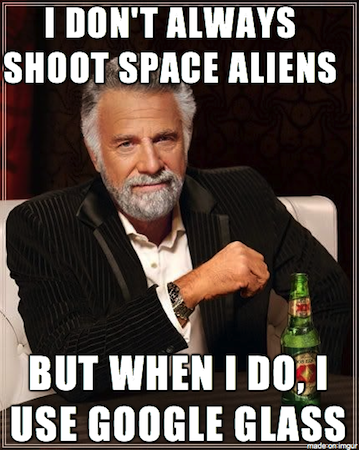Yes indeed. In a fascinating New York Times piece, Style author, Nick Bilton, offers new and intriguing details about the already somewhat epic Google Glass story – the rise, the fall and possible resurrection of a product that almost everyone can identify but virtually nobody actually owns (or even wants to buy…)
Among other things, consider the following: When what’s essentially a “tech article” contains a paragraph like this, you just know it’s gonna be good:
“At a Google developers conference in June 2012, for example, Glass-wearing sky divers landed on top of the auditorium, raced across the roof on bikes and into the conference hall to thunderous applause. (I was there and it was unlike any demo I had ever seen.) Mr. Brin seemed to revel in the attention and was labeled a real-life Tony Stark, from the Iron Man comics. Later that year, Mr. Brin would sit front row at Ms. von Furstenberg’s [fashion week] show, proudly accessorized with a pair of Glass.”
Seeing as Mr. Bilton’s expose is 100% worth reading in its entirety, I’ll just offer a few take-aways and leave it there. But if any of you happen to be “Google Glass Explorers,” I’d happily publish your personal experiences. For better or worse, Glass actually does seem here to stay…
- You can’t overcome actual product flaws such as an undefined purpose, massive concerns about privacy and public resistance to your product’s fundamental image with even the world’s most creative exclusivity-based marketing strategy. The idea of offering Google Glass first to the supposedly “privileged few” before doing a general launch wasn’t an inherently a bad idea. Had the product been ready (or even almost ready for prime-time), Google’s plans might well have succeeded. Unfortunately for Sergey and Larry,  this was a rare occasion in which the tech giant aimed, fired and then realized they’d forgot to set up a target.
- Regardless as to whatever happens with Google Glass, augmented reality (and increasingly limited virtual reality) products are ABSOLUTELY the “next big thing.” I fully agree with one of the mail points made here: envisioning Glass – at least in its current manifestation – as a product similar to a smartphone (e.g., something for the general consumer market) was never effectively analyzed. If instead introduced into speciality areas (e.g. doctors gaining insight from augmented reality while examining a patient; architects being able to rapidly understand the design components of a building under construction; or mechanical engineers seeking performance details about their creations in real time), augmented reality and Glass itself could prove exceedingly useful – and a major source of future profits.
- If your company is already the subject of multiple privacy investigations and claims of building something akin to Terminator’s “SkyNet,” it’s probably best not to construct a top secret laboratory at your corporate headquarters and then publicly name it “Google X…” And if you do decide to go down that thorny path, at the very least, purchase an evil secret underground island “lair…” Show some respect for the genre guys!
- Celebrity endorsements can absolutely be good PR – But only when you match the right celebrities with the right products. The notion that people would buy Google Glass as a fashion statement was obviously conceived by someone who doesn’t have the world’s greatest sense of fashion (not mentioning any names here – But let’s just say he might have had an affair with one of his twenty-something employees inside the Google-X complex…) One can imagine a far more effective campaign in which Google Glass had been demonstrated by high tech professionals and scientists, etc. Why? Because it would have made sense.
- My above comment about the future potential of augmented reality stands. However, using some of Google’s research money to run even a few focus groups exploring whether people actually enjoy walking down the street while have conversations with their glasses might have proved enlightening. Just sayin’…
Regardless, this is all a great story – and no doubt there will be a lot more to follow. Let’s hope the Times is wise enough to keep a great writer like Nick Bilton on the “Google beat” for a long time to come.


